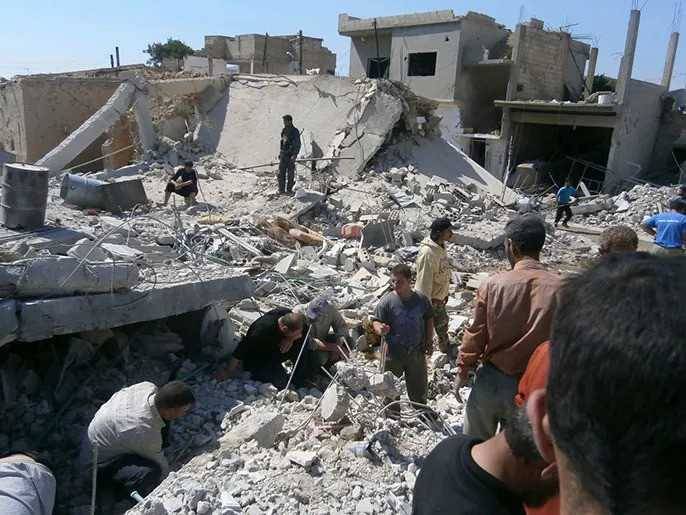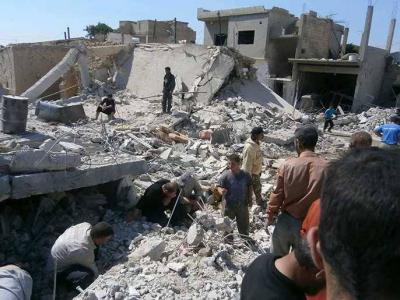A field tour by "Asharq Al-Awsat" in some villages of southern Lebanon, specifically the border town of Aita al-Shaab with Israel, revealed massive destruction has befallen the town, which has been completely emptied of its residents. This occurred amid an unannounced and temporary calm that allowed the residents of border towns to visit their towns on the morning of Eid al-Adha.
Field sources in southern Lebanon told "Asharq Al-Awsat" that a number of residents from the towns of Naqoura, Marwahin, Dahiya, Bustan, and Yarin flocked to their towns on the morning of Eid al-Adha to visit the graves and the few remaining residents, benefiting from the unannounced truce, which showed signs of reduced shelling exchanges from midnight Saturday to Sunday, until Sunday afternoon when limited shelling occurred in the area.
The sources indicated that the residents coordinated with the Lebanese army and civil defense, while the army informed UNIFIL that some residents of the border villages wanted to visit their towns on the morning of Eid, similar to what happened on the morning of Eid al-Fitr last time, to perform Eid prayers in their villages and inspect their homes. The coordination also includes Hezbollah.
The sources explained that army and civil defense vehicles waited for the residents at the shore of the town of Qleila (south of Tyre) to accompany the convoy towards the border villages at eight o'clock on Sunday morning. However, some residents hurried their visit, moving ahead of the convoy to their towns to inspect them and visit the graves, a Lebanese tradition on the mornings of Eid al-Fitr and Eid al-Adha, when people visit the graves of their family members.
The sources noted that these residents rushed to their towns to complete the visit before ten o'clock in the morning, the expected time for the end of the unannounced truce, as was the case during Eid al-Fitr. Visits are also expected to be repeated on Monday morning; residents of the towns of Shihin, Naqoura, and Tyre Harfa on the southern coast received invitations from the municipalities to visit their towns in the morning, planning to set out in convoys from southern Tyre at eight, with the visit ending at ten, indicating that the truce is temporary, even if it remains unannounced. Some residents from the eastern sector decided to visit their towns as well, noting that some residents of the town of Khyam visited the town after Sunday afternoon.
Shelling exchanges in the south have reduced to record levels since early Sunday, and no shelling exchanges were witnessed in the afternoon period, before the sound of sirens was heard east of the Israeli border city of Nahariya in the afternoon due to fears of drone infiltrations. Meanwhile, the Israeli army shelled the town of Yaron, and artillery sporadically shelled the outskirts of some villages, alongside large fires that broke out in several locations, including a large fire in Aytaour, and other fires in Shabia, Kfardounin, and Dir Antara, which is about 15 kilometers from the border.
These temporary visits are expected to reveal the immense destruction that has afflicted the border villages and towns due to shelling and Israeli airstrikes. The camera of "Asharq Al-Awsat" captured examples of the vast devastation that befell one of the border villages that endured the most severe assaults, namely the town of Aita al-Shaab, which is estimated to have experienced over 600 airstrikes and thousands of artillery shells since the war began on October 8. Phosphorus and incendiary munitions have destroyed hundreds of hectares of agricultural land and border groves.
Mohamed Sarour, the mayor of Aita al-Shaab, told "Asharq Al-Awsat" that the line connecting Aita from the town of Ramyeh (to the west) to the town of Rmeish to the east has seen 85 percent of its homes completely destroyed and leveled to the ground, while other neighborhoods suffered from shelling and destruction.
About 14,000 people are natives of this town, most of whom lived there year-round before the outbreak of the war. Sarour said in a video interview: "The houses that were not completely destroyed are on the verge of collapse due to the damage they sustained, while the means of livelihood have vanished from the town, where residents depend primarily on agriculture, particularly tobacco cultivation." Economic activity has completely ceased in the town following the full displacement of its residents.
Geographically, Aita al-Shaab is situated opposite four significant Israeli sites: Shatula, Al-Rahib, Natu'a, and Tal Sha'ar, placing it at the mouth of the fire, and intertwining the geography, which allows Hezbollah fighters to conduct military operations from its groves. Notably, the party kidnapped two Israeli soldiers in 2006 during a military operation from Khillat Warda in the town, prompting Israel to initiate a wide-scale war on Lebanon.
In the ongoing war, Hezbollah announced thwarting an Israeli infiltration into the town last March by detonating explosive devices against them. The Lebanese army also thwarted an Israeli attempt to set its groves on fire by extending fuel pipes to them months ago. Since the onset of the war, the town has mourned 17 individuals, including fighters and civilians killed by Israeli fire.




